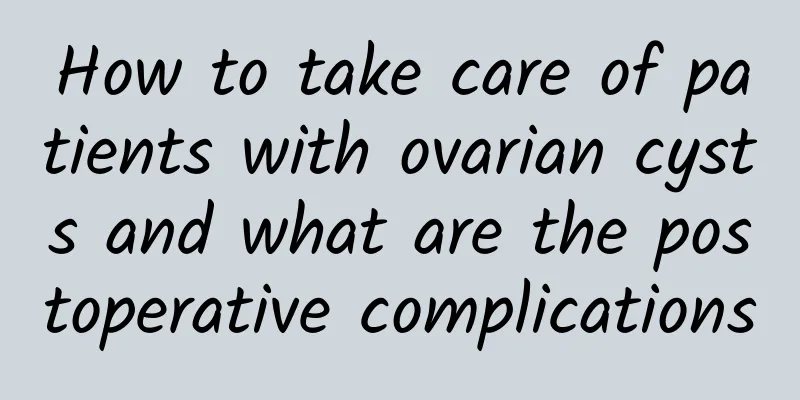What are the home care measures for pelvic inflammatory disease?

|
Pelvic inflammatory disease is a common gynecological disease, mostly caused by hygiene problems (personal hygiene, unclean sexual intercourse, etc.), which is very harmful to women's health. Therefore, care measures must be taken at ordinary times to reduce the occurrence of pelvic inflammatory disease. So, what are the home care measures for pelvic inflammatory disease? Acute pelvic inflammatory disease is manifested by lower abdominal pain and fever. If the condition is severe, there may be high fever, chills, headache, loss of appetite, etc. Chronic pelvic inflammatory disease is manifested by low fever and fatigue. When the disease lasts for a long time, there are symptoms of neurasthenia, such as lack of energy, general discomfort, insomnia, etc., as well as symptoms such as lower abdominal distension, pain, and lumbar pain. It is often aggravated after fatigue, sexual intercourse, and before and after menstruation. In addition, patients may also experience increased menstruation and leucorrhea. Family treatment measures Pay attention to personal hygiene Strengthen personal hygiene during menstruation, after childbirth, and after miscarriage, change underwear and sanitary napkins frequently, avoid colds, and avoid overwork. Eat more bland foods The diet should be light. Eat more nutritious foods such as eggs, tofu, red beans, spinach, etc. Avoid eating raw, cold and irritating foods. Avoid sexual intercourse during menstruation Avoid sexual intercourse during menstruation to avoid infection. Menstrual pads should be kept clean and hygienic, and it is best to use sterilized toilet paper. Avoid unnecessary gynecological examinations Try to avoid unnecessary gynecological examinations to prevent the infection from spreading and the inflammation from spreading. Medical staff must strictly adhere to aseptic operation Medical staff should strictly disinfect and strictly follow aseptic operation procedures during delivery and abortion uterine cavity surgery to avoid infection and pelvic inflammatory disease. For prevention, antibiotics should be taken appropriately after surgery to prevent infection. Other treatments Herbal Tea ① 9g of Chinese Angelica, 9g of Cyperus, 12g of Leonurus japonicus. Decoction in water, 1 dose per day. ② 10g peach kernel, 15g Patrinia chinensis, 10g black fungus. Decoction in water, twice a day. ③ 30g of fennel, 30g of gardenia, 10g of licorice. Grind them into powder and take 2-3g each time, 2-3 times a day. ④ 50g of Astragalus, 15g of Angelica, 10 jujubes, and appropriate amount of brown sugar. Decoction in water. ⑤ 20g of wolfberry, 20g of angelica, and an appropriate amount of lean pork. Season and cook soup, eat the meat and drink the soup. Acupressure The patient lies on his back with his knees bent. The operator stands on his right side and performs regular abdominal massage several times. Then press Qihai, Guanyuan, Xuehai, and Sanyinjiao for half a minute each, and then lift the lower abdomen with both hands several times. Apply more manipulations to the painful areas. It is used to treat chronic pelvic inflammatory disease. |
<<: What are the dangers of vaginitis
>>: What are the treatments for chronic adnexitis?
Recommend
Where to treat cervical warts
Sitting and waiting for death is not an option fo...
How vaginal candidiasis is spread
Vaginal candidiasis must be actively prevented to...
Experts teach women how to effectively prevent pelvic inflammatory disease
Pelvic inflammatory disease is a gynecological di...
What medicine should I take to treat uterine fibroids? What food should I be most afraid of eating when I have uterine fibroids?
Uterine fibroids are a common benign tumor in wom...
Four research-based causes of pelvic inflammatory disease
For female friends, it is very important to under...
How to regulate menstruation
Missed periods are not uncommon among women, but ...
What foods are good for endometriosis?
Diet can make or break your health, so we must be...
Is it okay if I got my period right after having sex?
Getting your period right after sex usually doesn...
Five main symptoms of cervicitis
There may be more than 5 symptoms of cervicitis, ...
What are the causes of irregular menstruation? These 4 causes can lead to irregular menstruation
Causes of irregular menstruation Some women have ...
How to care for adnexitis at home?
As one of the common gynecological diseases, the ...
When is the best time to have a painless abortion?
The best time for painless abortion is 35 to 50 d...
Can I take a shower and wash my hair after having an abortion?
You can take a shower and wash your hair after an...
Eat these 7 superfoods wisely to help burn fat and detoxify!
Improper diet, irregular work and rest, or sittin...
Cost of early treatment of pelvic peritonitis
The body is like a machine, and it is inevitable ...









